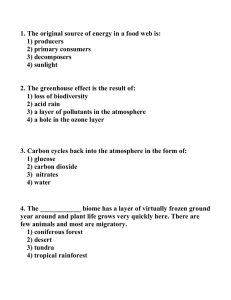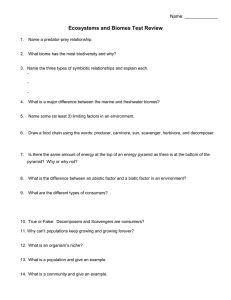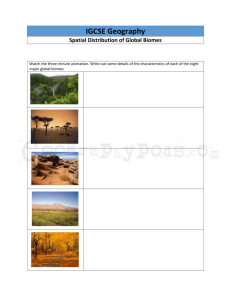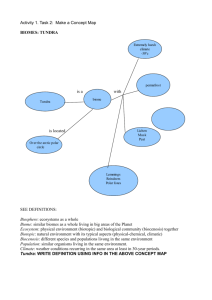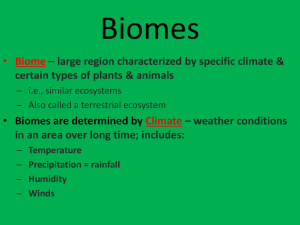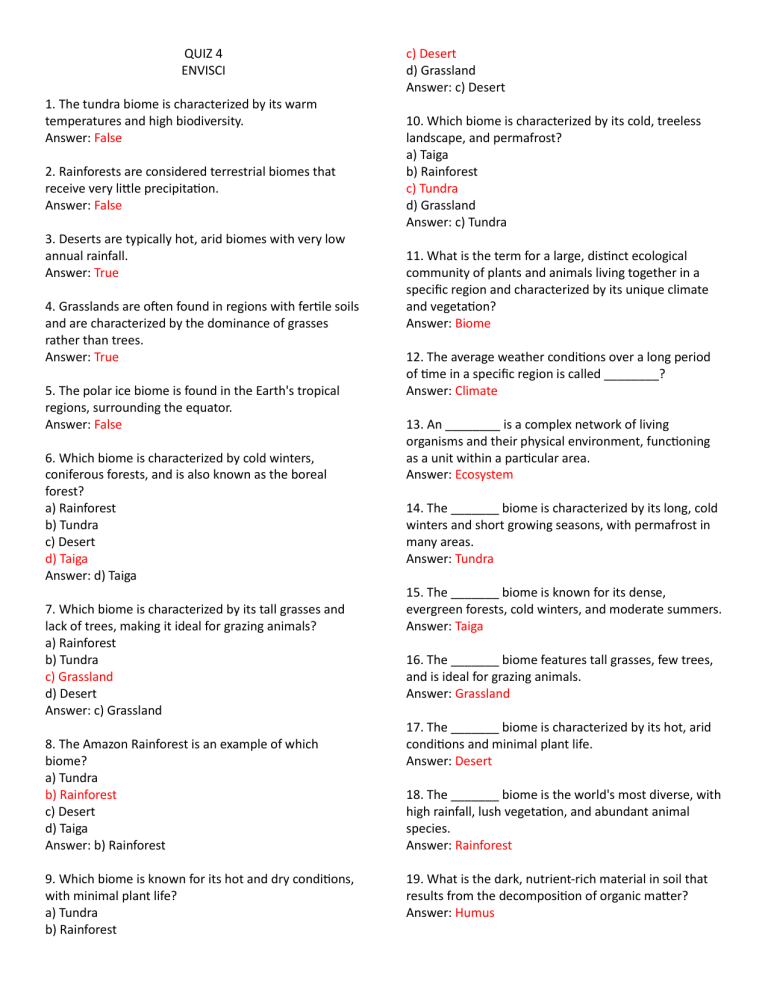
QUIZ 4 ENVISCI 1. The tundra biome is characterized by its warm temperatures and high biodiversity. Answer: False 2. Rainforests are considered terrestrial biomes that receive very little precipitation. Answer: False 3. Deserts are typically hot, arid biomes with very low annual rainfall. Answer: True 4. Grasslands are often found in regions with fertile soils and are characterized by the dominance of grasses rather than trees. Answer: True 5. The polar ice biome is found in the Earth's tropical regions, surrounding the equator. Answer: False 6. Which biome is characterized by cold winters, coniferous forests, and is also known as the boreal forest? a) Rainforest b) Tundra c) Desert d) Taiga Answer: d) Taiga 7. Which biome is characterized by its tall grasses and lack of trees, making it ideal for grazing animals? a) Rainforest b) Tundra c) Grassland d) Desert Answer: c) Grassland 8. The Amazon Rainforest is an example of which biome? a) Tundra b) Rainforest c) Desert d) Taiga Answer: b) Rainforest 9. Which biome is known for its hot and dry conditions, with minimal plant life? a) Tundra b) Rainforest c) Desert d) Grassland Answer: c) Desert 10. Which biome is characterized by its cold, treeless landscape, and permafrost? a) Taiga b) Rainforest c) Tundra d) Grassland Answer: c) Tundra 11. What is the term for a large, distinct ecological community of plants and animals living together in a specific region and characterized by its unique climate and vegetation? Answer: Biome 12. The average weather conditions over a long period of time in a specific region is called ________? Answer: Climate 13. An ________ is a complex network of living organisms and their physical environment, functioning as a unit within a particular area. Answer: Ecosystem 14. The _______ biome is characterized by its long, cold winters and short growing seasons, with permafrost in many areas. Answer: Tundra 15. The _______ biome is known for its dense, evergreen forests, cold winters, and moderate summers. Answer: Taiga 16. The _______ biome features tall grasses, few trees, and is ideal for grazing animals. Answer: Grassland 17. The _______ biome is characterized by its hot, arid conditions and minimal plant life. Answer: Desert 18. The _______ biome is the world's most diverse, with high rainfall, lush vegetation, and abundant animal species. Answer: Rainforest 19. What is the dark, nutrient-rich material in soil that results from the decomposition of organic matter? Answer: Humus 20. What is the term for the permanently frozen layer of soil typically found in cold regions, such as the tundra? Answer: Permafrost 28. The tropical savanna biome is known for its lush, dense vegetation and high tree canopy. Answer: False 21. What environmental variable primarily determines the classification of biomes? a) Annual precipitation b) Temperature c) Wind patterns d) Elevation Answer: a) Annual precipitation 29. Tropical rainforests are typically located near the equator and have consistent temperatures throughout the year. Answer: True 22. Which of the following environmental variables plays a crucial role in the formation of deserts? a) High humidity b) Low temperatures c) Low precipitation d) High elevation Answer: c) Low precipitation 23. Which environmental factor influences the presence of permafrost in tundra biomes? a) High temperatures b) Low evaporation rates c) Low vegetation d) Low average annual temperatures Answer: d) Low average annual temperatures 24. The distribution of oceanic biomes, such as coral reefs and kelp forests, is strongly influenced by which variable? a) Soil quality b) Water depth c) Wind speed d) Air humidity Answer: b) Water depth 25. Which environmental factor is responsible for the distinct seasons in temperate deciduous forests? a) Precipitation patterns b) Temperature fluctuations c) Altitude d) Soil type Answer: b) Temperature fluctuations 26. Tropical rainforests are characterized by their distinct seasons, including a cold winter. Answer: False 27. The tropical rainforest biome experiences high levels of annual precipitation and humidity. Answer: True 30. Coral reefs are often found in tropical marine biomes and are formed by the accumulation of dead coral polyps. Answer: True 31. Desert biomes are characterized by high levels of annual precipitation and lush vegetation. Answer: False 32. Many desert plants have adaptations such as succulent leaves and stems to store water. Answer: True 33. The Sahara Desert is the coldest desert in the world, known for its frigid temperatures year-round. Answer: False 34. Deserts are devoid of animal life due to the extreme arid conditions. Answer: False 35. Desert biomes can be found on every continent, except Antarctica. Answer: True 36-40. Enumerate the environmental variables affecting the biomes. 36. Sunlight 37. Temperature 38. Water and dissolved salts 39. Oxygen 40. Metabolic waste

